
Maryland Democrat Elijah Cummings, a 63-year-old black Baptist congressman from Baltimore, spent Monday in Utah, looking through the soaring red rock Window Arches surrounded by desert. He was still digesting the “excellent” barbecue chicken from a Dutch-oven the night before, when he rode a flatbed boat on the Colorado river in Canyonlands National Park. And he still wanted to talk about his weekend trip in the King Air twin-propeller plane used by Utah Governor Gary Herbert and his chance to meet a state county commissioner whose wife had been recently treated for cancer. “That was so significant to me,” Cummings told TIME, who has called his vote for the Administration’s signature healthcare law the most important of his 18-year career. “Cancer is a big factor in my family and in my district.”
All along this voyage of discovery, Utah Republican Rep. Jason Chaffetz, a 47-year-old Mormon who opposed Obamacare, was by Cummings side, and neither would have had it any other way. The two-night Chaffetz-Cummings trip was designed to deepen a bond first forged in June, when Chaffetz went to Baltimore to better understand the seniors, former convicts and AIDS patients in Cummings’ district. Now Cummings, his black Under Armour t-shirt poking out underneath his polo, trekked west to learn about the consequences of putting the Gunnison Sage-Grouse on the endangered species list and economic impacts of designating 1.8 million acres around Canyonlands as a national park. Chaffetz, whose mother died from cancer, said their talk about the disease was “a reminder to [Cummings] that we have a lot in common.”
Commonality matters because Chaffetz and Cummings may soon control one of the most bitterly partisan and dysfunctional bodies in the U.S. Congress, the House Oversight and Government Reform Committee. The current chairman, Republican Darrell Issa of California, will be stepping down in January because of term limits, ending a tenure that has been marked by ceremonial shout fests, banging gavels and few measurable accomplishments. Democrats have attacked Issa for exploiting partisan outrage and forging few legislative responses to legitimate scandals, including the botched “Fast and Furious” gun-trafficking sting, the 2012 Benghazi terrorist attack and the Internal Revenue Service’s targeting of political groups. Some Republicans have also, more quietly, expressed dismay at the committee’s lack of accomplishments. In March, committee decorum hit a new low-point when Issa shut off Cummings’ microphone during an IRS hearing, which Issa quickly then adjourned before later apologizing.
Few can imagine Cummings ever choosing to spend recreational time with Issa. But with Chaffetz, whose reputation is both conservative and cordial, the two men seem to have hit it off. Cummings says Chaffetz would not wield the gavel like Issa if chosen as the next chairman, even though the two Republicans are close on the political scale. “Although we have disagreements, I have always found him to be non-disagreeable,” says Cummings. Like a twin, or at least a congressman used to sharing the stage, Chaffetz agreed almost word-for-word with Cummings in a separate phone interview. “We’re going to disagree on most issues,” Chaffetz told TIME. “I just don’t want to be disagreeable.”
On Tuesday, the two men showed up together on MSNBC’s Morning Joe to show a united front. “I want a relationship which will allow us to get things done,” said Cummings. “I actually want to get some stuff done,” said Chaffetz.
In interviews, the two men brought that same level of comity in their descriptions of each others districts, which lie on opposite ends of the political spectrum. “They wanted to preserve their environment but at the same time they wanted to be able to use their land,” said Cummings, who noted that some ranchers he met were their families’ seventh generation working the land. “I thought I would hear from folks who were just one-sided. But I felt that they were trying to reach some kind of balance.”
“We’ve got some issues in Utah that are uniquely western,” said Chaffetz, who wore jeans and brown leather cowboy boots around Canyonlands. “You can’t truly appreciate that until you feel and see it. The same is true in Baltimore. They’re dealing with a ton of issues such as food deserts [neighborhoods lacking in healthy food options] that I’ve never heard before.”
Chaffetz and Cummings may even start to dress alike. Waiting for Cummings in his Capitol Hill office is a gift, a brown, felt cowboy hat from Burns Saddlery, “a real one,” says Chaffetz, who owns a black version.
“I don’t know that I’d recommend he wear his hat in his district, but if he comes out West again he’ll look right at home,” Chaffetz said. “And I’m not wearing a cowboy hat in Baltimore unless I want to get my butt kicked.”
More Must-Reads from TIME
- Donald Trump Is TIME's 2024 Person of the Year
- Why We Chose Trump as Person of the Year
- Is Intermittent Fasting Good or Bad for You?
- The 100 Must-Read Books of 2024
- The 20 Best Christmas TV Episodes
- Column: If Optimism Feels Ridiculous Now, Try Hope
- The Future of Climate Action Is Trade Policy
- Merle Bombardieri Is Helping People Make the Baby Decision
Contact us at letters@time.com